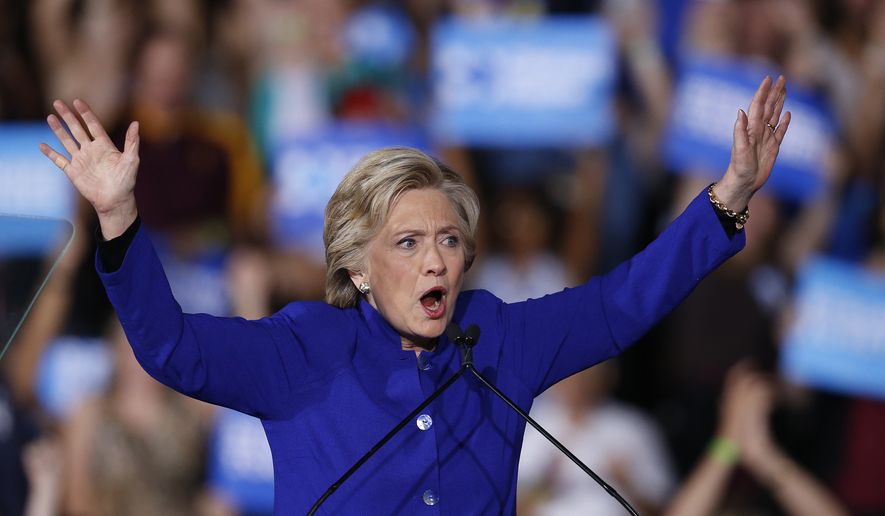Judicial Watch asked a federal court Thursday to order former Secretary of State Hillary Clinton to answer questions about why she created her secret email system and whether she was aware of the dangers that her account could be hacked, challenging the objections she raised in a written deposition last month.
In written testimony, Mrs. Clinton refused to say where she got her figure, given in congressional testimony, that at least 90 percent of her emails were already captured by the State Department’s official system, citing lawyer-client privilege.
She also said questions about her adherence to cybersecurity practices and her thinking in setting up her secret email were outside the bounds of legal discovery in the case, which deals with whether the State Department properly maintained and searched her messages.
But Judicial Watch asked Judge Emmet G. Sullivan to force Mrs. Clinton to answer all of those questions, saying she was misreading the case and the law.
“By refusing to answer our simple questions, Hillary Clinton is obstructing our efforts to get basic information about her email practices,” said Judicial Watch President Tom Fitton.
Earlier this week Judicial Watch asked Judge Sullivan to compel the man responsible for storing Mrs. Clinton’s records to testify.
John Bentel, a former State Department official, refused to answer any of Judicial Watch’s questions, claiming a Fifth Amendment right against incriminating himself. Judicial Watch said Mr. Bentel was unlikely to face legal jeopardy from the case, so he can’t shield himself with the Fifth Amendment.
Judge Sullivan earlier this year ordered a number of officials to be deposed in the case, including top Clinton personal aide Huma Abedin, who also had an account on Mrs. Clinton’s secret server.
Some legal analysts have said Ms. Abedin may have misled in her deposition when she insisted she’d sought out all of her electronic devices that may have held official State Department records. The FBI last week revealed that it has obtained new messages, reportedly from Ms. Abedin’s computer she shared with her estranged husband, Anthony Weiner, that could add to their understanding of Mrs. Clinton’s email behavior.
Later Thursday the State Department released emails that show Mrs. Clinton and a senior aide discussed sending a secure cellphone to the secretary of state by FedEx or a personal courier. The State Department said either approach would have been acceptable if the telephone was rendered inoperable for the journey.
The Associated Press reported that the unusual exchange from 2010 begins with Ms. Abedin telling her boss that she would mail the secure phone from Washington before her husband, then-Rep. Weiner, takes her to the airport. Mrs. Clinton asks if one of Mr. Weiner’s assistants could make the delivery.
“OK I will (redacted) just fedex secure cell phone from dc. Anthony leaving office to bring me to airport now so hopefully will make it just in time,” Ms. Abedin writes in the afternoon of Aug. 2, 2010.
“Maybe one of Anthony’s trusted staff could deliver secure phone?” Mrs. Clinton responds four hours later.
The emails show the degree of trust Mrs. Clinton had for Mr. Weiner before he was hit by scandal. Ms. Abedin is perhaps Mrs. Clinton’s closest aide, and Bill Clinton officiated at her wedding to Mr. Weiner.
The exchange was among 1,280 pages of emails that the department released Thursday. The department received the documents from the FBI and received a court order to release them under the Freedom of Information Act. The documents weren’t among the 55,000 pages of emails Mrs. Clinton provided to the department in 2014 and which have already been published online. Mrs. Clinton has not turned over more than 33,000 emails she and her lawyers have deemed private.
Of those previously released, the department classified more than 2,000 emails, mostly at the “confidential” and next-highest “secret” levels. Twenty-two emails were withheld entirely from publication on grounds that they were “top secret.”
No new classifications were made Thursday. Many of the new documents are “near duplicates” of those previously released, State Department spokesman Mark Toner said.
Ms. Abedin recently separated from Mr. Weiner after the latest in a series of sexually explicit text messages surfaced from the onetime rising star of the Democratic Party.
Mrs. Clinton and Ms. Abedin wrote to each other using private email addresses outside the State Department’s system, a practice that has roiled the Democratic nominee’s campaign for the presidency. Mrs. Clinton has apologized for using a private email account connected to a server in the basement of her New York home. The FBI announced last week it was examining emails found on a computer seized from Mr. Weiner during its unrelated investigation of his sexually explicit texts to a 15-year-old girl in North Carolina.
Mr. Weiner resigned his seat in Congress in 2011 after accidentally posting on Twitter a picture of himself in his underwear, which he intended as a private message to a woman who was not his wife. In 2013 the publication of further messages killed his campaign for New York mayor.
It is unclear where Mrs. Clinton was at the time of the emails. State Department schedules listed no public events for her between July 27 and Aug. 2, 2010.
Mr. Toner said it was unclear how the phone might have been delivered, or if it was at all. He said officials wouldn’t speculate.
But Mr. Toner stressed that the options mentioned by Mrs. Clinton and Ms. Abedin would have been appropriate if the necessary safeguards were taken.
⦁ This story is based in part on Associated Press dispatches.
• Stephen Dinan can be reached at sdinan@washingtontimes.com.




Please read our comment policy before commenting.